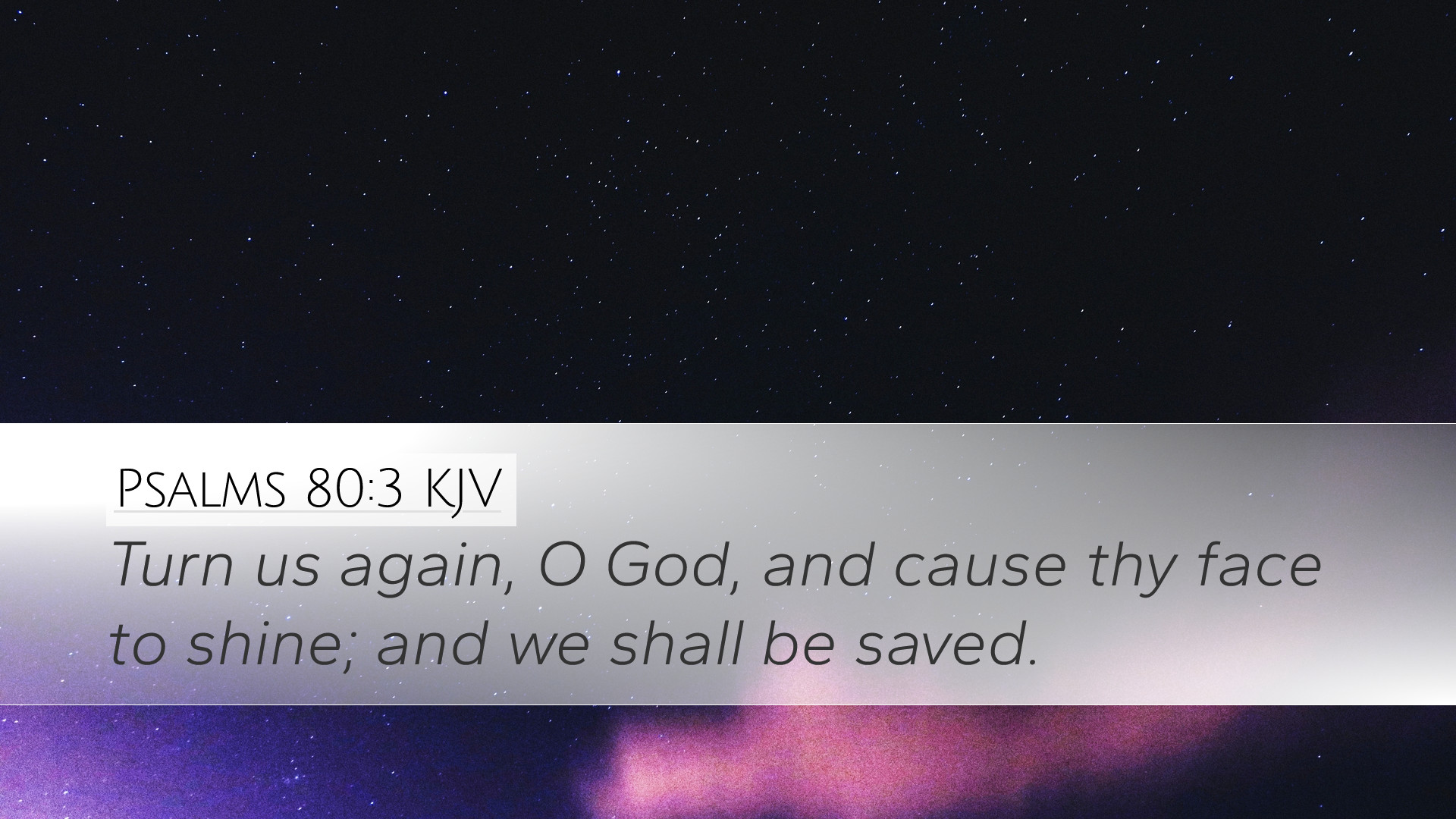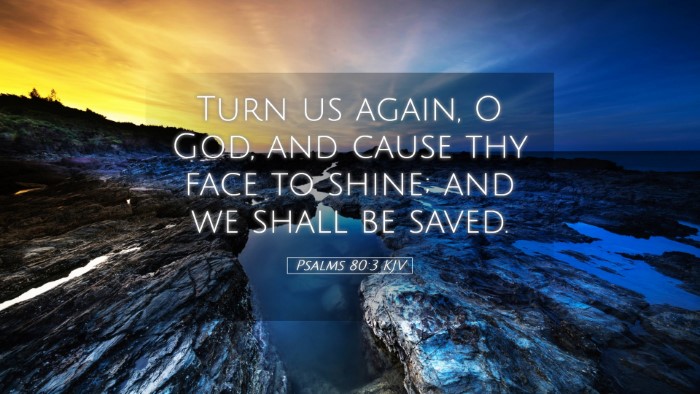Psalms 80:3 Commentary
Verse: "Restore us, O God; make Your face shine on us, that we may be saved."
Introduction
The psalmist calls upon God to restore His people. This cry reflects a deep desire for divine intervention and is filled with theological significance. Through an analysis of public domain commentaries by notable scholars like Matthew Henry, Albert Barnes, and Adam Clarke, we can glean insights that enhance our understanding of this profound verse.
Context of the Psalm
This Psalm is attributed to Asaph and expresses the lament of Israel during a time of distress. It serves as a poignant reminder of the covenant relationship between God and His people. The repeated call for restoration suggests a community grappling with divine abandonment and seeking reconciliation.
Meditation on "Restore Us, O God"
Matthew Henry emphasizes that restoration implies a prior state of favor. This plea for restoration indicates both physical and spiritual renewal. The notion of restoration encompasses healing from affliction and a return to righteousness. Such a longing for restoration teaches us about the nature of sin, separation from God, and the genuine human reliance on divine grace.
- Spiritual Restoration: The heart of the matter is the longing for a deep, spiritual revival among the people.
- Community Cry: The use of the plural “us” signifies that restoration is not just for individuals but for the collective body, showcasing the importance of community in spiritual matters.
The Theological Implication of God's Face Shining
“Make Your face shine on us” is a powerful metaphor. Albert Barnes remarks that the "face" symbolizes God's presence and favor. The shining of God’s face is akin to illumination, blessing, and guidance. This alludes to the Aaronic blessing in Numbers 6:25, which expresses the desire for God's favor upon His people. A shining countenance suggests comfort, protection, and approval, contrasting the despair that arises when God's face is hidden.
- Symbol of Favor: The shining of God’s face serves as a mark of His favor upon His people.
- Divine Relationship: This verse brings attention to the relational aspect of God’s engagement with humanity. It encourages believers to seek a vibrant communion with God.
The Desire for Salvation
The final phrase “that we may be saved” reveals the ultimate aim behind the request for restoration. Adam Clarke points out that this indicates a plea for not just immediate deliverance from troubles but also for a deeper salvation that restores the soul. Here, "salvation" can encompass physical deliverance from enemies and spiritual salvation from sin.
- Physical and Spiritual Dimensions: You cannot separate physical deliverance from spiritual renewal; they are interconnected in the theology of salvation.
- The Role of Faith: The request indicates a faith that acknowledges human inability to save oneself and the necessity of divine intervention.
The Broader Biblical Context
Understanding Psalm 80:3 in light of other scriptural references enhances its meaning. The theme of restoration is not only confined to this verse but flows throughout scripture—from the fall in Genesis to the restoration seen in Revelation. The New Testament echoes this by presenting Jesus as the ultimate restorer of humanity.
- Jesus as the Restorer: In the New Testament, Jesus’ ministry embodies the fulfillment of this psalm's longing. The Gospel narratives present Him as the one who restores sight to the blind, heals the broken-hearted, and forgives sins.
- Eschatological Restoration: The final restoration promised in biblical prophecy gives hope that God's face will ultimately shine upon all of creation, culminating in the new heaven and earth.
Application for Today
This psalm echoes through the ages, calling individuals and communities to seek God earnestly. In a world often marked by chaos and despair, the cry for restoration remains relevant. Leaders, students, and theologians are reminded to advocate for a return to spiritual faithfulness within their communities.
- Prayer and Repentance: We are called to identify areas where we need restoration in our spiritual lives and to approach God in repentance.
- Collective Worship: As the psalm emphasizes community, congregations are encouraged to join in collective prayer, seeking God’s face to shine upon them once again.
- The Importance of Spiritual Revival: Churches can reflect on their mission and open themselves to a fresh move of the Holy Spirit.
Conclusion
Psalms 80:3 encapsulates a profound yearning for restoration, illuminating our understanding of God’s character and our relationship with Him. This verse serves as a call not just for personal healing but for communal revival. By acknowledging the need for God’s presence, perhaps we can experience a true awakening, making this timeless prayer our own.


